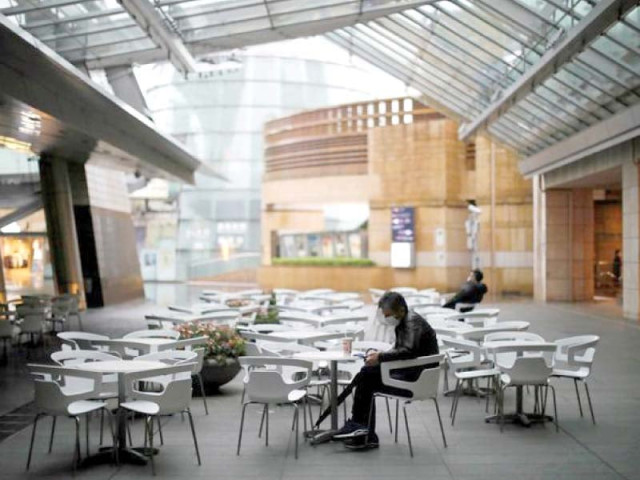A year of unprecedented loss
Services sector records negative growth of 0.6% for first time since 1960s

Growth in much of the world’s services sector was anaemic in 2020 as industries were worried about the economic destruction caused by the Covid-19 pandemic across the globe.
In Pakistan, one of the most hard-hit areas was the services sector, which for the first time since the 1960s recorded a contraction of 0.6% from July 2019 to March 2020, revealed the Economic Survey of Pakistan 2019-20.

Terming services a supporting sector for the economy, senior economist Dr Ashfaque Hasan Khan said the negative growth came on the back of dismal performance of the manufacturing and agriculture sectors.
The services sector has strong backward and forward linkages with other sectors of the economy and contributes significantly to cross-border trade. It complements the production process and is considered the glue that binds various segments and components of finished goods.
However, the gruesome Covid-19 pandemic undermined the increasing importance of the sector in the value chain, creating challenges for policymakers to understand its role and frame policy to support the struggling sector in 2020.
With the objective of curbing the spread of Covid-19, social distancing was implemented, which resulted in a months-long lockdown that severely impacted activity in contact-intensive businesses. Thus, the negative impact was so pronounced that overall performance of the services sector during 2020 remained dismal.
Massive layoffs, bankruptcies and closure of business were some of the outcomes faced by the services sector.
Unfortunately, there is no accurate data available for the unprecedented mass layoffs and furloughs as one of the biggest challenges is statistics of the services sector which are difficult to assess.
While on the one hand, restaurants, hotels, tourism, etc were burning down financially due to the measures taken by the government, delivery services on the other hand boomed.
The pandemic, in all means, sent delivery services into overdrive. However, the overall negative growth of the sector overshadowed the positive momentum caused by the boom in delivery services.
“There are three important elements that define the services sector; firstly, it employs most of the people, secondly, it is a small-scale sector and lastly, there is no job security as most of the workers are hired on a contractual basis,” said Pakistan Institute of Labour, Education and Research (PILER) Executive Director Karamat Ali.
Speaking to The Express Tribune, he stated that Prime Minister Imran Khan had constantly stressed that there should be no layoffs and companies would be supported in paying salaries to their employees on time.
However, there was no check and balance and moreover, no labour census was available because nobody was ready to share data.
“Despite the presence of complaint centres in labour departments, workers avoided filing complaints as they feared the wrath of their employers,” he revealed.
Hospitality industry
One of the first sectors which was badly affected by Covid-19 was the hospitality sector as it was on the forefront and borne negative impact of the global crisis.
“The initial three to four months were tough for the entire sector,” recalled an official of a renowned hotel. “Nevertheless, businesses picked up after the first wave of coronavirus. The industry responded well to seasonal demand and helped hotels recoup some of the losses.”
He added that the ban on international travel coupled with increased local travel turned out to be fruitful for resorts and helped them recover losses. “Because of that the second wave did not affect business as it did during the first wave of Covid-19.”
Shedding light on layoffs, he said it was one of the toughest decisions for a company to make. “However, now as business is picking up, hotels are recalling their trained staff.”
Looking at 2021 as a year of recovery, he remarked, “Despite the looming challenge, we are optimistic that in the new year, businesses will improve and profitability will increase.”
Virtual brands
While in a scenario where there were restrictions on dining and takeaways, delivery services enjoyed the freedom of working.
“We saw a 20-25% increase in delivery services after the first wave of Covid-19,” revealed All Pakistan Restaurants Association (APRA) Convener Ather Chawla while speaking to The Express Tribune.
“While on one hand, several businesses were shutting down, on the other hand several virtual brands were launched and reaped benefits of the soaring delivery demand.”
Virtual restaurants are food service businesses that serve customers through “hidden” kitchens exclusively by delivery based on phone orders or online food ordering.
Endorsing Chawla’s views, Careem spokesperson said year 2020 had been like no other year, especially in terms of digital transformation witnessed in Pakistan. “The pandemic paved the way for growth of e-commerce while enabling people to move towards a digital lifestyle,” he added.
With people staying indoors, services like food delivery, banking and online shopping recorded a significant rise.
He was of the view that considering the current customer trend, the food and delivery business would undoubtedly pick up pace significantly.
However, with good comes bad. The APRA convener lamented that unfortunately where food delivery apps enhanced the reach of restaurants, these aggregators - the food delivery apps - also exploited the positive momentum and caused disruption within the working process of many restaurants.
“Restaurants were laying off staff to reduce their cost of working; these aggregators were hiring riders to expand their service; a major employer shift was observed in the restaurant industry,” he stated.
Transport sector
Another major industry which suffered was the transportation and commutation sector. While public transport had been hit hard, ride-hailing services were no different.
“At the start of the pandemic, we had to temporarily suspend our services in some cities in Pakistan until the government and regulatory authorities saw ride-hailing services safe to be resumed,” the Careem spokesperson stated.
“Initially, the business went down but we saw a decent recovery after relaxation in lockdown and we are extremely optimistic that we will see an uptrend in the ride-hailing services in 2021.”
Shedding light on the future of services sector, Karamat Ali added that the services sector had no capacity to create job opportunities independently. “To increase performance of the services sector, we need to move towards industrialisation, which in turn will help improve performance of the services sector.”
Published in The Express Tribune, December 30th, 2020.
Like Business on Facebook, follow @TribuneBiz on Twitter to stay informed and join in the conversation.




1733130350-0/Untitled-design-(76)1733130350-0-208x130.webp)













COMMENTS
Comments are moderated and generally will be posted if they are on-topic and not abusive.
For more information, please see our Comments FAQ